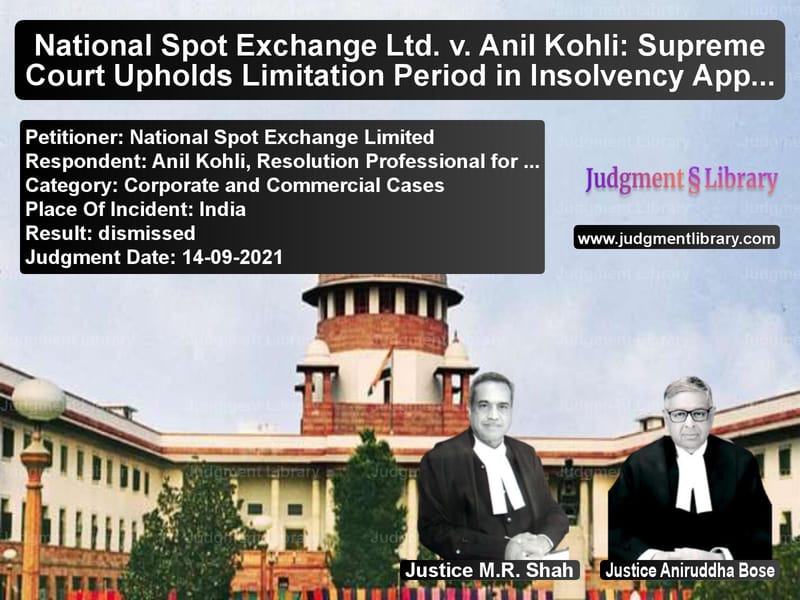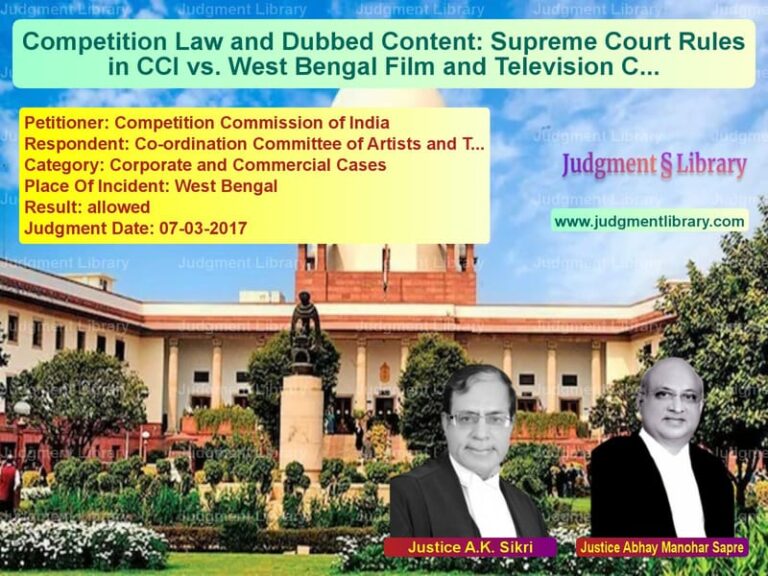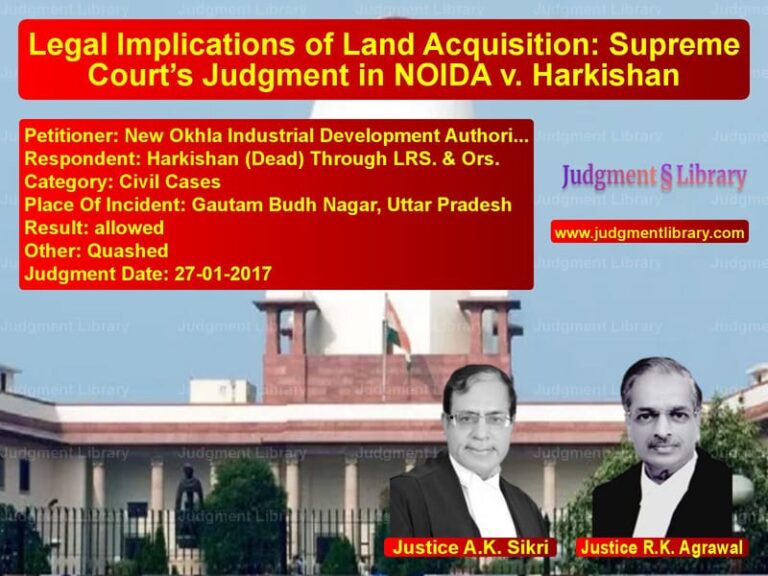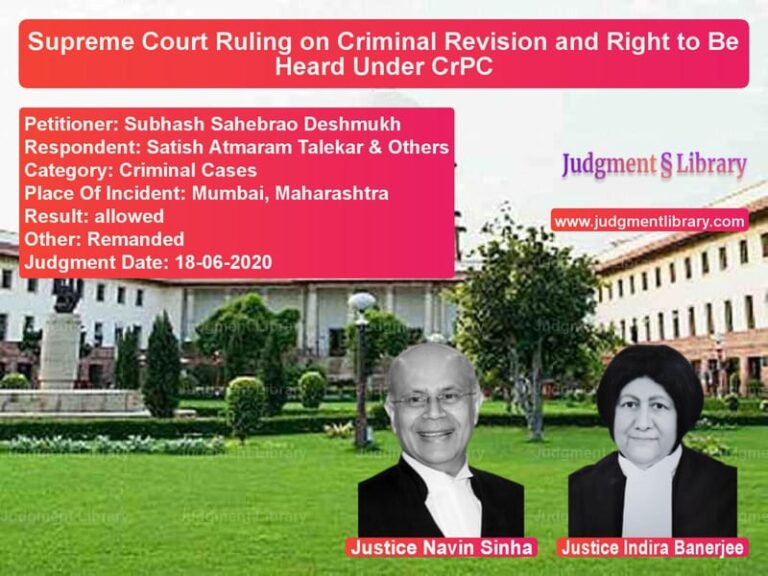National Spot Exchange Ltd. v. Anil Kohli: Supreme Court Upholds Limitation Period in Insolvency Appeals
The case of National Spot Exchange Limited v. Mr. Anil Kohli, Resolution Professional for Dunar Foods Limited revolved around the strict interpretation of the limitation period in insolvency proceedings under the Insolvency and Bankruptcy Code (IBC), 2016. The Supreme Court had to determine whether the National Company Law Appellate Tribunal (NCLAT) had the jurisdiction to condone delays beyond the statutory limit prescribed under Section 61(2) of the IBC.
Background of the Case
National Spot Exchange Limited (NSEL) filed an appeal against an order passed by the National Company Law Tribunal (NCLT), rejecting its claim as a creditor of Dunar Foods Limited (Corporate Debtor). The NCLT dismissed NSEL’s claim, stating that there was no privity of contract between NSEL and Dunar Foods and that no direct liability existed.
Feeling aggrieved, NSEL approached the NCLAT, but the appeal was delayed by 44 days. The maximum permissible delay under Section 61(2) of the IBC is 15 days beyond the standard 30-day period. NCLAT refused to condone the delay, stating it lacked jurisdiction to do so.
NSEL then filed an appeal before the Supreme Court, arguing that the delay should be condoned under Article 142 of the Indian Constitution, considering the peculiar facts of the case.
Key Legal Issues
- Whether the NCLAT had the jurisdiction to condone a delay beyond the 15-day extension period specified in Section 61(2) of the IBC.
- Whether the Supreme Court could invoke its discretionary power under Article 142 to allow the appeal despite the statutory limitation.
- Whether NSEL’s claim as a creditor should have been entertained despite a lack of direct contractual relationship with Dunar Foods.
Arguments by the Petitioner (NSEL)
NSEL argued that:
- The delay in filing the appeal was due to genuine reasons and should be condoned.
- The Supreme Court has the power under Article 142 to provide relief even when the limitation period has expired.
- Dunar Foods and its sister concern, PD Agro, were involved in fraudulent financial transactions amounting to over ₹744 crores, which should have been considered by the insolvency tribunal.
- The Bombay High Court had already passed a decree against PD Agro, and since Dunar Foods was a beneficiary of siphoned funds, NSEL’s claim should be considered valid.
Arguments by the Respondent (Resolution Professional)
The Resolution Professional contended that:
- Section 61(2) of the IBC clearly limits the extension of the appeal period to 15 days beyond the 30-day period, and courts have no power to extend it further.
- NSEL had no direct privity of contract with Dunar Foods, making its claim legally untenable.
- Judicial precedents, including Union of India v. Popular Construction Co. (2001) 8 SCC 470, establish that statutory limitation periods must be strictly followed.
- Once the limitation period prescribed by the statute has expired, no equitable relief can be granted.
Supreme Court’s Analysis
The Supreme Court, comprising Justices M.R. Shah and Aniruddha Bose, examined the language and intent of Section 61(2) of the IBC.
Key Findings
- Statutory Limitation Period Must Be Followed: The Court held that NCLAT correctly refused to condone the delay as it had no jurisdiction to do so.
- Article 142 Cannot Override Statutory Limits: While the Supreme Court has wide discretionary powers, it cannot be used to circumvent explicit statutory provisions.
- No Privity of Contract: Since NSEL had no direct legal contract with Dunar Foods, its claim as a creditor was invalid.
Key Observations by the Supreme Court
“The Appellate Tribunal has no jurisdiction at all to condone the delay exceeding 15 days from the period of 30 days, as contemplated under Section 61(2) of the IBC.”
“Once the statute provides the period of limitation and specifically states that delay cannot be condoned beyond a particular period, the courts must strictly adhere to the legislative intent.”
Final Judgment
The Supreme Court upheld the NCLAT’s decision and dismissed NSEL’s appeal, ruling that:
- NCLAT was right in rejecting the appeal due to the delay of 44 days, which exceeded the statutory limit.
- The Court cannot use Article 142 to extend limitation periods prescribed by the legislature.
- NSEL’s claim as a creditor was rightly rejected by the NCLT.
Implications of the Judgment
This ruling has significant consequences for insolvency proceedings:
- Strict Adherence to Limitation Periods: The judgment reinforces that delay beyond the statutory period in IBC cases is not condonable.
- Limited Role of Article 142: The Supreme Court clarified that discretionary powers cannot override statutory limitations.
- Protection Against Fraudulent Claims: The decision prevents unrelated creditors from making indirect claims in insolvency proceedings.
Conclusion
The Supreme Court’s ruling in National Spot Exchange Ltd. v. Anil Kohli sets a crucial precedent in insolvency law. By strictly upholding the limitation period under Section 61(2) of the IBC, the judgment ensures that the resolution process remains time-bound and efficient. This decision further establishes that courts cannot extend limitation periods beyond what is expressly permitted by law, reinforcing the principle of certainty in insolvency proceedings.
Petitioner Name: National Spot Exchange Limited.Respondent Name: Anil Kohli, Resolution Professional for Dunar Foods Limited.Judgment By: Justice M.R. Shah, Justice Aniruddha Bose.Place Of Incident: India.Judgment Date: 14-09-2021.
Don’t miss out on the full details! Download the complete judgment in PDF format below and gain valuable insights instantly!
Download Judgment: national-spot-exchan-vs-anil-kohli,-resoluti-supreme-court-of-india-judgment-dated-14-09-2021.pdf
Directly Download Judgment: Directly download this Judgment
See all petitions in Bankruptcy and Insolvency
See all petitions in Judgment by Mukeshkumar Rasikbhai Shah
See all petitions in Judgment by Aniruddha Bose
See all petitions in dismissed
See all petitions in supreme court of India judgments September 2021
See all petitions in 2021 judgments
See all posts in Corporate and Commercial Cases Category
See all allowed petitions in Corporate and Commercial Cases Category
See all Dismissed petitions in Corporate and Commercial Cases Category
See all partially allowed petitions in Corporate and Commercial Cases Category







